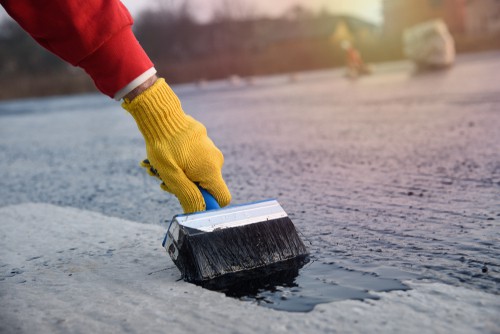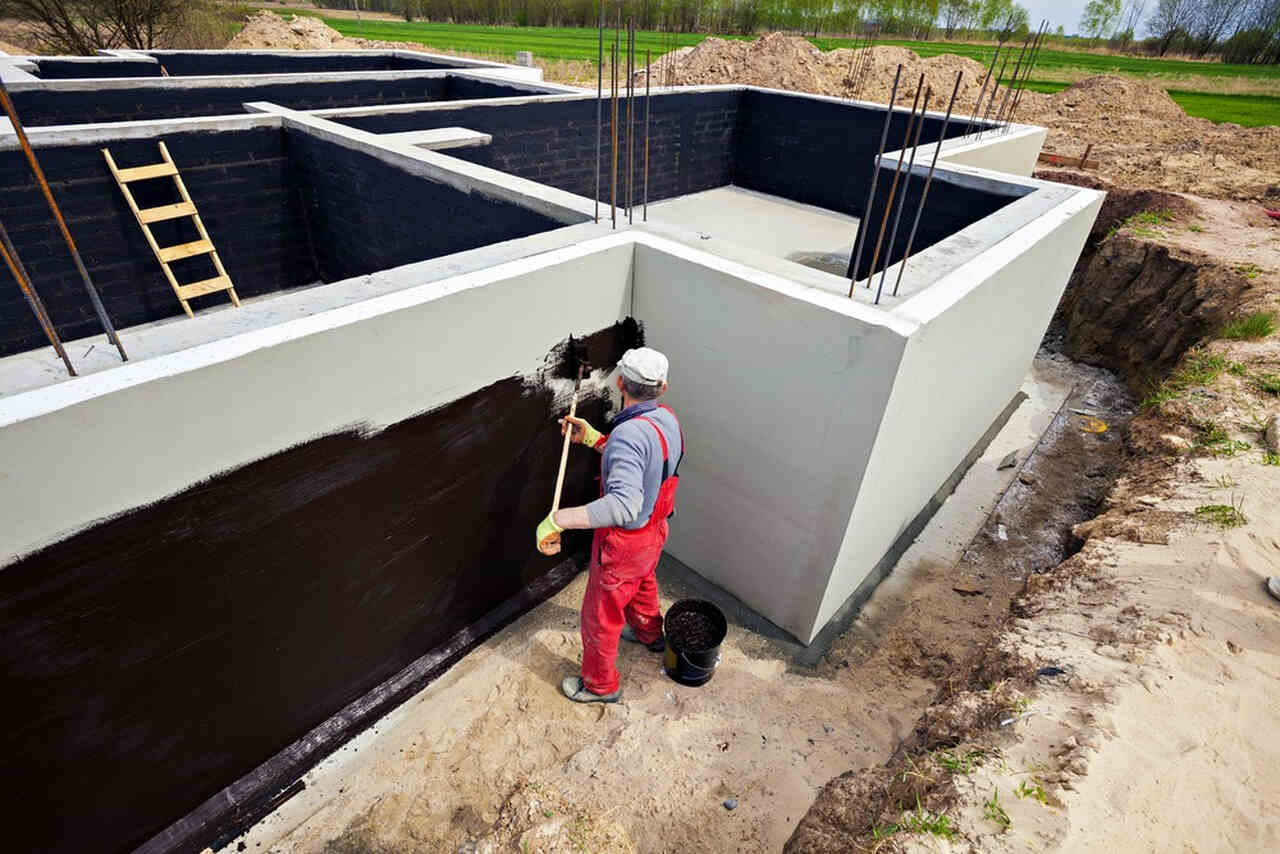
Everything about Waterproofing: Understanding Its Significance and Benefits for Your Home
Waterproofing is a necessary element of home maintenance that numerous home owners ignore. It offers to safeguard frameworks from the damaging results of water infiltration, which can lead to significant concerns with time. Recognizing the different techniques and their significance can help house owners make educated decisions. As the conversation unravels, the actual inquiry stays: how can effective waterproofing change a home's durability against moisture-related threats?
What Is Waterproofing and Just How Does It Function?
Waterproofing is a vital process made to shield buildings and structures from water seepage. It entails the application of different products and strategies that produce an obstacle, stopping water from permeating surface areas. Usual waterproofing techniques include making use of membranes, coverings, and sealers, which can be put on roofing systems, structures, and walls. Each method is chosen based on the certain needs and problems of the structure.The effectiveness of waterproofing relies upon appropriate installation, making certain that all areas are properly covered and secured. Materials such as bituminous membrane layers, liquid waterproofing substances, and cementitious finishes are regularly utilized, each offering unique advantages. Furthermore, drainage systems might be incorporated to redirect water far from vulnerable locations, additionally enhancing defense. On the whole, waterproofing not only safeguards structural integrity however additionally improves long life, making it an essential factor to consider in construction and remodelling tasks.
The Importance of Waterproofing for Property owners
Home owners encounter various difficulties in keeping their residential properties, and among one of the most significant issues is water damage. This concern can emerge from various sources, including heavy rainfall, flooding, and plumbing failures. When left unaddressed, water damage can result in serious structural issues, mold and mildew development, and pricey repairs. Waterproofing stands as an important safety net that secures homes from these possible dangers.
Usual Waterproofing Approaches and Strategies
When considering waterproofing methods, property owners can pick from a range of efficient options. Outside waterproofing remedies concentrate on protecting against water from passing through the structure, while interior waterproofing strategies address dampness issues once they have actually taken place. Recognizing these choices is necessary for maintaining a dry and healthy and balanced home atmosphere.
Exterior Waterproofing Solutions
To safeguard a building from water breach, different exterior waterproofing options can be utilized, each tailored to the details requirements of the structure. One usual approach is the application of waterproof membrane layers, which create an obstacle against moisture. These membrane layers can be either liquid-applied or sheet-based, depending upon the installation needs. One more effective method includes using drain systems, such as French drains, that redirect water away from the structure. Furthermore, applying exterior sealers can assist safeguard surface areas from water penetration and corrosion. Landscaping solutions, consisting of grading and proper water drainage, can also add significantly to stop water build-up around the foundation. Each of these techniques plays an important role in improving the longevity and toughness of the building.
Interior Waterproofing Techniques
Inside waterproofing techniques are important for guarding a home against wetness and water damages. Common methods include the application of sealants and membranes, which create an obstacle on wall surfaces and floors to avoid water seepage. Inside drain systems, such as sump pumps and French drains, effectively redirect water away from at risk locations. Furthermore, vapor barriers can be set up to obstruct moisture from permeating via wall surfaces and floors, specifically in cellars and crawl areas (Sump pump discharge drainage Omaha). Normal upkeep and inspection of these systems are very important to ensure their efficiency. In addition, resolving any kind of pipes leakages or condensation concerns promptly can greatly enhance the total waterproofing strategy. With each other, these methods offer house owners with a complete technique to lessening the danger of water-related issues

Indications Your Home Demands Waterproofing
Homeowners ought to understand vital indicators that their building might require waterproofing. Noticeable water damages, moldy smells, and constant mold and mildew growth are vital indications that moisture is jeopardizing the honesty of the home. Addressing these issues quickly can stop further damage and ensure a much healthier living setting.
Visible Water Damage
Visible water damage works as a clear sign that a home might call for waterproofing measures. Property owners need to be vigilant for signs such as water spots on walls or ceilings, peeling off paint, and distorted flooring. These visible symptoms commonly symbolize underlying wetness problems that, if left unaddressed, can cause more extensive damage and pricey fixings. Mold and mildew growth can also occur, though it will certainly be reviewed in the following section. Additionally, homeowners need to check basements and crawl spaces for wetness or efflorescence on concrete surface areas, which indicates dampness infiltration. Observing these signs early can help prevent better degeneration of the home's structural stability. Timely waterproofing measures can secure the investment and keep a healthy living environment.
Musty Odors Existing
Moldy smells are commonly a dead giveaway that wetness is lingering in concealed areas of a home, showing the requirement for waterproofing solutions. These undesirable smells regularly occur from wet basements, creep spaces, or behind wall surfaces, where water infiltration might not be right away noticeable - French drain installation Omaha. House owners ought to pay close focus to these odors, as they suggest that excess moisture is trapped, possibly leading to additional damage. The visibility of mildewy smells can endanger indoor air quality, affecting the health and wellness and comfort of homeowners. Neglecting this advising indicator can lead to more serious problems, making timely evaluation and action vital. By resolving waterproofing demands, property owners can get rid of mildewy smells and create a healthier living environment
Regular Mold Development
Constant mold and mildew development is you can look here a clear indicator that a home might be experiencing moisture issues, requiring waterproofing procedures. Mold and mildew prospers in wet settings, making it a substantial concern for homeowners. Signs of mold can include dark spots on walls, ceilings, and around windows, as well as a persistent musty smell. If mold appears repeatedly despite cleaning initiatives, it recommends underlying dampness troubles. This can arise from leakages, insufficient drainage, or high humidity levels. Ignoring these indicators can bring about architectural damage and health risks, specifically for people with respiratory system problems. As a result, dealing with waterproofing promptly can help minimize mold and mildew growth, guaranteeing a safer and much healthier living setting. Homeowners need to think about professional analyses to identify the level of the wetness problem.
The Long-Term Conveniences of Investing in Waterproofing
Spending in waterproofing offers house owners a profound complacency and comfort, recognizing their residential property is protected against moisture-related damages. This aggressive method significantly reduces the danger of architectural issues, such as timber rot and structure fractures, which can bring about costly fixings in time. In addition, waterproofing helps preserve interior air quality by lessening mold and mildew growth, which can have unfavorable health ramifications for occupants.Furthermore, waterproofing improves the durability of a home, eventually maintaining its value. A well-protected residential property is more appealing to prospective customers, as they are less likely to come across surprise dampness problems. This investment likewise adds to power performance; properly sealed spaces avoid drafts and minimize cooling and heating costs. In general, the lasting advantages of waterproofing not just guarantee the structural stability of a home however additionally foster a healthier living environment and reinforce the residential property's marketability.
Choosing the Right Waterproofing Expert for Your Home
Exactly how can a house owner assurance they choose the most certified waterproofing expert for their requirements? The process starts with comprehensive research and obtaining multiple quotes. Home owners need to look for experts with a solid credibility, verified qualifications, and considerable experience in waterproofing. Examining on the internet evaluations and asking for references can give useful insight into a contractor's reliability and top quality of work.Moreover, it is necessary to ask about the details waterproofing techniques each professional their explanation uses, in addition to the materials made use of. House owners should validate that the chosen contractor is accredited and insured, which protects versus potential responsibilities. A trustworthy specialist will additionally use a detailed agreement outlining the extent of work, timeline, and service warranty information. By concentrating on these criteria, house owners can make informed decisions, inevitably causing boosted security versus water damage and an effective waterproofing solution tailored to their home's demands.
Often Asked Inquiries
Can Waterproofing Be Performed In Winter Months or Cold Weather?
Waterproofing can be testing during wintertime or winter as a result of lower temperature levels impacting products' adhesion and treating procedures. Specialized items designed for cold conditions can allow effective waterproofing applications also in winter months.
How Frequently Should I Waterproof My Home?
The regularity of waterproofing a home commonly relies on different aspects, including climate and More hints worldly high quality. Experts recommend reviewing problems every year and reapplying every five to 10 years, or faster if considerable wear is apparent.
Does Waterproofing Affect Home Resale Worth?
Waterproofing can substantially impact a home's resale value (Foundation waterproofing Omaha). Possible buyers often check out waterproofing as a protect versus water damage and mold and mildew, boosting the residential property's appeal and bankability, potentially bring about higher deals and quicker sales
Is DIY Waterproofing Effective for All Residences?
The efficiency of DIY waterproofing differs by home. Factors such as building age, environmental problems, and existing damage impact results. Homeowners need to examine their particular conditions before attempting DIY services to assure lasting security.

Exist Eco-Friendly Waterproofing Options Available?
Environmentally friendly waterproofing options do exist, including all-natural sealants like beeswax and plant-based items. These options reduce environmental influence while successfully securing structures from water damages, attracting property owners seeking lasting options for their waterproofing requires.